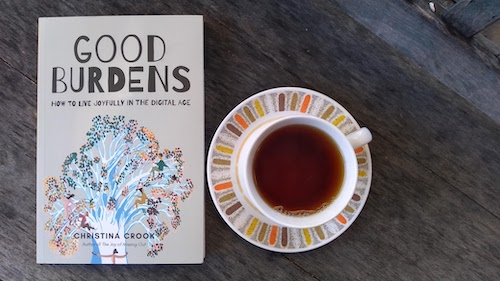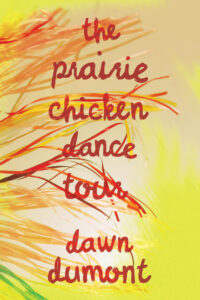November 4, 2021
The Prairie Chicken Dance Tour, by Dawn Dumont
I’ve gone back in my archives to remember when it was that Dawn Dumont, from the Okanese Cree Nation, became one of my favourite Canadian authors, and turns out it was 2015 when I read Rose’s Run, “a book that’s funny, breezy and heartwarming, and then manages to include a terrifying demon in the mix who feeds on the strength of women, so I was hooked in a cannot-turn-out-the-light-until-I’m-done kind of way, an I’m-going-to-have-nightmares kind of way (and I did!)…”
She followed up Rose’s Run, her second novel, with Glass Beads two years later, a novel in stories in which the demons were less literal, the narrative tracing four friends through decades of their lives, loves and losses, ups and downs, a novel that similarly irreverent if more realist, as well as heartbreaking and hilarious at the very same time.
Heartbreaking and hilarious is a tricky balance but in her fourth fiction release, Dumont has done it again. The Prairie Chicken Dance Tour is set in 1972 as food poisoning has taken down the Prairie Chicken dance troupe on the eve of their European tour, cowboy John Greyeyes reluctantly agreeing—even though he hasn’t danced in years—to lead a cobbled-together team of subs as a favour to his brother who’s Chief of the Fineday Reserve. (Politics factor large in all Dumont’s novels; she also served as a Liberal candidate in the September 2021 Federal election, something else on her CV now, in addition to novelist, lawyer, and stand-up comedian).
As can be expected of any novel that begins with diarrhea and features a hijacking within the first three chapters, The Prairie Chicken Dance Tour is indeed a string of madcap adventures, funny and ribald, over the top and unconstrained, and unrelentingly amusing. Greyeyes has to contend with a young dancer who flirts with anything that moves, her uptight Catholic auntie, plus a fourth member of their group who isn’t who he says he is, not to mention the original leader of the dance troupe whose stomach has finally recovered and is on her way over to Europe to take up the job that should have been hers to begin with.
The book is fun, but it also pulls no punches. Set in 1972, its main characters are survivors of residential schools in a country that has not even begun to reckon with this, living with the trauma and broken bonds of these experiences. Dumont showing too that every person who’s able to survive has their own way of doing so, which can be complicated, as is the case with Edna, who finds strength and solace in the Catholic church and whose processing of her experiences doesn’t immediately make sense from the outside.
But Dumont shows us each of these characters from the inside, deftly using fiction set fifty years ago to consider ideas and issues of racism, cultural genocide, and the possibility of reconciliation that have never been more timely. Using humour too to diffuse the pain, to create the chance for some kind of happy ending.
November 3, 2021
Gleanings

- Unvaccinated people didn’t just arrive in Toronto from Mars. They are products of a culture that over the last few generations has become increasingly individualistic, distrusting and focused on personal welfare over the larger community.
- It’s a very bizarre thing to find yourself squeeing in the middle of a gut-wrenching and upsettingly graphic story about the bubonic plague. And yet. Here we are.
- Last week we held a celebration of life for my mother and yesterday we hosted a baby shower for my oldest daughter.
- But somehow the days accumulated until yet another summer had passed, and I didn’t swim to the island.
- But why the maniacal drive for completeness? And what is completeness, anyway?
- So yes, I was today years old when I realised I was happy – definitely the best birthday present I could ask for.
- No bluegrass song has ever been written about freaking THROAT COAT TEA
- I think Beautiful World also offers a more affirmative response, though: that there is value in both love and art, that they are what can make the world beautiful, that they are worth believing in and standing up for, and that the novel (including this novel) is one way of doing that.
- (for the life of me i will never ever be able to keep a secret about myself. for others? til death. but myself? never ever. Is this a flaw? a strength? a quirk? idgaf. yes, that.)
- I think part of me thought it was too typical that a woman would write about food, and that I wanted to make my voice known on other topics. But somehow, I’m still hungry.
- But the history of kitchen cabinets and the appliances tucked in snugly between them is not pretty or seamless. It’s brimming with attempted liberation, deliberate oppression, Cold War marketing and feminist utopias founded on white supremacy. And it’s still stewing.
- Afterwards, when the street was quiet and the night was black, we blew out the candles in the pumpkin and brought him inside. I thought about how some things that we avoid actually turn out to be good.
- In his book, Williams uses the word whiplash to describe the sensation of going about one’s daily life until, without warning, one is confronted by a reminder of race and its implications
- So yes, I do aspire to be kinder, more generous. I aspire to give you what you want before you ever ask. But most deeply I aspire to be eccentric
- The coconut word triggered a few memories of instances when I felt misjudged or slightly vulnerable because of my skin colour.
- Asked what her first principle for detecting a good story was, Schoemperlen speaks in terms that echo Kennedy, albeit with fewer lethal connotations. “The stories to which I felt an immediate connection were the ones that just made me say, ‘Wow!’”
November 2, 2021
Good Burdens is here!

If my Blog School course had a textbook, Christina Crook’s Good Burdens would be it, a heartful and inspiring book about living a mindful and joyful digital life. After blogging for more than twenty years (and using my social media platforms as an extension of my blogging space), I know that the tools of the internet are capable of making our lives richer and deepening social connections, but that involves considered and deliberate practice, a willingness to go against the grain and serve ourselves (and each other) instead of an algorithm. And the payoff? A meaningful online life whose riches spill over into the real world in the form of friendships, inspiration, and creative work.
What is a Good Burden? Our good burdens are the work we do to that add meaning to our lives—partaking in a community project, putting dinner on the table where family will gather, sending a card or a letter to a friend. In a world where technology promises endless ease and convenience, it’s too simple to forget how much these kinds of gestures matter, both to our communities and to ourselves.
And in Good Burdens, Crook shows that the notion of good burdens can bring light and meaning to our digital experiences, and also to the rest of our lives. She urges her readers to pay attention to the world around them and to those things which deliver joy. What is joy and how do we find it? How do happy people use technology differently than other people? What makes a good life? How do you get there?
The book is a warm, inviting and engaging read, but also structured as a workbook with space for readers reflect and write down ideas, offering personalized approaches instead of one-sized-fits-all solutions, urging us to ask ourselves the right questions instead of promising answers. Good Burdens is about ideas that I think about a lot, but I still found it rich and inspiring—and really enjoyed the opportunity to talk with Crook on a recent episode of her JOMOcast all about the spaces where her ideas and my own blog thoughts overlap.
I first read this book as an advanced reader copy, and liked it so much I pre-ordered a finished copy, and then the publisher sent me a finished copy, so now I have two! If you would like the chance to win a copy of Good Burdens, make sure you’re signed up for one of my newsletters (sign up for the Pickle Me This Digest or the Blog School Newsletter) for a chance to win my spare copy. If you’re on my mailing list already, watch your inboxes—coming Friday!
And if you just can’t wait, you can go to your local bookstore and pick up Good Burdens today.






